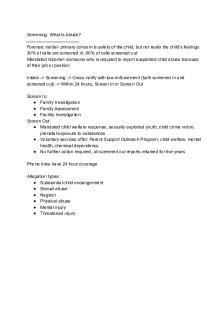PSYCH 650 Lecture Notes Comorbidity IN Substance Abuse PDF

| Title | PSYCH 650 Lecture Notes Comorbidity IN Substance Abuse |
|---|---|
| Author | carie dearing |
| Course | Psychopathology |
| Institution | University of Phoenix |
| Pages | 1 |
| File Size | 65.6 KB |
| File Type | |
| Total Downloads | 80 |
| Total Views | 148 |
Summary
LECTURE NOTES...
Description
PSYCH 650 LECTURE NOTES COMORBIDITY IN SUBSTANCE ABUSE
Substance abuse is an addiction to where a person craves drugs. This may be at times very compulsive and often uncontrollable. The person with the drug addiction will often use and abuse their drug of choice and will not care what may happen to them or anyone around them while using. When you take a look at substance abuse and co-morbidity it is an entirely different picture. In order to receive help for these two combined you need to understand what is actually happening with the person suffering from it. Substance abuse and co-morbidity are where the person is suffering from both a drug addiction and a mental illness combined. For example it would refer to a person who is addicted to methamphetamines and also suffers from schizophrenia together. Over the past four decades, researchers have had significant progress with many disorders such as alcohol abuse that also suffered from anxiety disorder or co-morbidity. Dependency of depressive disorder, alcohol, post-traumatic stress disorder. The brain and the body's stress level serve as a mechanism to link how relationships of the comorbidity conditions how they are more frequent. Another part of the co-morbidity sex explains how and why women and men are so different in developing risk with alcoholism and stress disorders. Comorbidity among disorders are demonstrated in various ways by researchers. First, researchers like to illustrate that it is highly probable for a drug addicted individual to be diagnosed with a mental disorder and vice versa. People who frequently use drugs are more likely to suffer from a mood disorder or even anxiety which leads them to addictive drug use and behaviors. Researchers like to demonstrate that “drug abuse may bring about symptoms of another mental illness and mental disorders can lead to drug abuse, possibly as a means of “selfmedication” (National Institute on Drug Abuse, 2011)”. There are multiple ramifications that can exist with a comorbid disorder versus a single diagnosis. Patients who have both a drug use disorder and another mental illness often exhibit symptoms that are more persistent, severe, and resistant to treatment compared with patients who have either disorder alone (Yolkow, 2010). There is a concern with proper care and treatment. Substance abuse and mental illness may require treatment through different systems. One center may not have the knowledge to administer medications required by the other. Other ramifications include delayed diagnosis, treatments can be less effective, psychopathological symptoms are more severe and impairment of social functioning. This is a challenge for clinicians since many illnesses present similar symptoms.
National Institute on Drug Abuse. (2011, March). What is Comorbidity. Retrieved from NIH: https://www.drugabuse.gov/publications/drugfacts/comorbidity-addiction-other-mentaldisorders Yolkow, N. D. (2010). Comorbidity: Addiction and Other Mental Illness. National Institute on Drug Abuse, retrieved from https://www.drugabuse.gov/sites/default/files/rrcomorbidity.pdf....
Similar Free PDFs

Chapter 17 Substance Abuse
- 1 Pages

Lecture Notes (Psych)
- 43 Pages

Psych 100 - lecture notes
- 20 Pages

Psych Tpapn - Lecture notes
- 4 Pages

Domestic Abuse Notes
- 40 Pages

Psych Chp. 22 - Lecture notes
- 5 Pages

Care Plan Psych - lecture notes
- 2 Pages
Popular Institutions
- Tinajero National High School - Annex
- Politeknik Caltex Riau
- Yokohama City University
- SGT University
- University of Al-Qadisiyah
- Divine Word College of Vigan
- Techniek College Rotterdam
- Universidade de Santiago
- Universiti Teknologi MARA Cawangan Johor Kampus Pasir Gudang
- Poltekkes Kemenkes Yogyakarta
- Baguio City National High School
- Colegio san marcos
- preparatoria uno
- Centro de Bachillerato Tecnológico Industrial y de Servicios No. 107
- Dalian Maritime University
- Quang Trung Secondary School
- Colegio Tecnológico en Informática
- Corporación Regional de Educación Superior
- Grupo CEDVA
- Dar Al Uloom University
- Centro de Estudios Preuniversitarios de la Universidad Nacional de Ingeniería
- 上智大学
- Aakash International School, Nuna Majara
- San Felipe Neri Catholic School
- Kang Chiao International School - New Taipei City
- Misamis Occidental National High School
- Institución Educativa Escuela Normal Juan Ladrilleros
- Kolehiyo ng Pantukan
- Batanes State College
- Instituto Continental
- Sekolah Menengah Kejuruan Kesehatan Kaltara (Tarakan)
- Colegio de La Inmaculada Concepcion - Cebu








